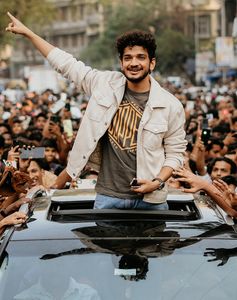The extraordinary story of 32-year-old Munawar Iqbal Faruqui, winner of the 17th season of Bigg Boss (Indian television’s biggest reality show) is worthy of a biopic. Frankly, I hadn’t heard of the stand-up comic, poet and rapper, till I watched the coverage of his victory parade, when he took the trophy to his modest home, waving to a sea of delirious fans cheering him as he stuck his head out of the sunroof of his fancy car. At first, I thought I was watching the usual fan-mania outside Shah Rukh Khan’s Mannat—the superstar’s palatial seaside bungalow. But hello! These visuals were from gritty Dongri, not snotty Bandra. Dongri—Mumbai’s most notorious ghetto, once home to gangsters like Dawood Ibrahim, Haji Mastan, Tiger Memon, Chhota Shakeel, Abu Salem. Dongri—from where the dreaded D-Gang operated. Dongri—shunned by Mumbaikars, and damned by cops. Here was a son of Dongri, who had won the hearts of millions of viewers and walked away with prize money and gifts worth more than Rs1.4 crore. This was no freaky win. The thousands who had turned up to greet him, did so out of genuine admiration. Shopkeepers in Dongri had put up his posters, while neighbourhood eateries offered discounts on food. Their boy had won! A Dongri boy had brought glory to their neighbourhood. No longer would Dongri be seen as nothing more than a dangerous, overcrowded slum that bred international gangsters and where crime was a way of life. Munawar had altered and upgraded Dongri’s image overnight!
Munawar, a driver’s son, left Junagadh in 2002 after his home was burnt during the Godhra riots. His father moved the family to Mumbai, and subsequently, Munawar lost both parents. He dropped out of school, did odd jobs, sold utensils at Rs60 a day. Till he discovered his forte—black comedy! Not everybody was amused by his humour. Munawar spent 37 days in jail following his arrest by the Madhya Pradesh police in Indore on New Year’s Eve 2021, when he was picked up mid-performance for what was called a ‘hate speech’. Several stand-up comedians representing southeast Asia, stood by Munawar, offering support and solidarity, citing their right to freedom of expression.
Today, Munawar has 4.7 million subscribers to his YouTube channel, 11.6 million followers on Instagram. His net worth is pegged at Rs8 crore, based on his fees of Rs15 lakh per paid post, and Rs2.5 lakh per stage show. His video, ‘Dawood Yamraaj & Aurat’ has garnered 20 million views, and Munawar is already planning his next professional moves.
His personal life is as interesting as his dazzling rise to fame. But fans are not judgmental at all. On the contrary, they admire him for being upfront and responding candidly to frequent ‘womaniser’ rumours. His dating pattern is avidly monitored on social media. Life on the fast track is likely to transform Munawar’s disarming personality—that’s a given. Soon, he will be seen sporting designer wear at red carpet events and schoomzing with celebrities from the other side of the railway track. Munawar’s makeover is on. You can take the man out of Dongri, but you can’t take Dongri out of him—and that is Munawar’s real strength. Dongri inspires his work and lyrics. Dongri is his bedrock. When a Dongri resident said “the trophy has finally reached Dongri”, it was a rich tribute to the grime and dirt of Dongri and led to the success of Dongri’s darling—Munawar.
I want to go on a biryani date in Dongri with Munawar. Working on it!


